- Home
- Alex Hughes
Sharp Page 12
Sharp Read online
Page 12
“I’ll add one more thing, and then I’ll leave it alone. I’m the new guy, I get that. I don’t expect the clouds to open up and friendliness shine down. But the hostility, well, I don’t think it’s helping your case with the girl. It’s not an observation about anything except Cherabino.”
I sighed. “I’ll try to lighten up.”
“I’d appreciate it.”
* * *
Cherabino showed up at my borrowed desk downstairs with food. Two large cardboard containers of delicious-smelling Mexican food. Through the Link, I could feel her determination—and small, quiet fear. It was the best, the simplest, the most understandable thing I’d felt all day.
“Break room?” she asked.
“Sure.”
She didn’t like Mexican food, my all-time favorite kind of meal. For her to bring it to me was a big deal, especially with what had happened at the funeral. “What’s going on?” I asked. It was too early for dinner, and too late for lunch. But I hadn’t eaten and neither had she.
Cherabino led the way, and settled down, handing out napkins and silverware with studied concentration.
“I thought you were pissed,” I said.
She blew out a breath. “We’ll get Emily’s boss back in the station if we can; if not, we’ll go there. You were out of line to yell at me, but I was out of line to interrupt you in the middle of your thing. You’re good at the interrogations, and if you say you were getting somewhere—”
“Apology accepted.”
She shot me a look, and annoyance leaked out over the Link. That’s right, when she was apologizing, she wanted to apologize.
I pulled out my heaping pile of tofu enchiladas and chimichangas—the latter with real meat, it looked like—and waited for Cherabino to cut up her plain cheese quesadillas. I might have eaten several heaping forkfuls while I waited.
“I have to work a double for Electronics Crimes tonight,” she said, like an excuse. “I need the calories. And if I was ordering anyway . . .”
“You said you weren’t helping them out anymore,” I said, taking the bait. I’d talk about air; hell, I’d talk about shoes if it would make her more comfortable.
She finished chewing with a determined look. Then: “Manuel quit. It’s just for a month or so while they hire somebody to replace him.”
I nodded companionably, like I actually believed her. “And your close rate’s still higher than most of Homicide, am I right? Just how many hours did you work last week, anyway?”
She swallowed. “None of your business.”
Ah, eighty-plus, then. Some things didn’t change. I took another bite of the chimichanga, deciding it was a really, really well-seasoned faux beef. Delicious, though, with just enough jalapeno to be interesting. Yum.
“People deserve justice,” Cherabino said, still avoiding the subject she’d come for. “There’s widows and families out there who deserve answers. People left behind.”
Like she’d been left behind, once. She shied away from the thought of her dead husband, as she always did; it was too painful. But I’d seen the grave site now. I knew what it was she wouldn’t think about.
“What did you come here to ask me?” I prompted. I could steal it from her mind—assuming the Link and my rusty telepathy would let me—but she had made a big deal of politeness and I was trying to do the same.
She took a breath, put her fork down. “I hate this Link. I hate it. But you’re right, you didn’t mean to do it, and it’s going to fade.” Determination punctuated her words. “It will fade. And it’s . . . there’s some things I . . .”
“Yes?”
“I need your help, okay? Not just the case stuff. I’m trying to apologize, okay? For being unreasonable about the Link thing. I’m trying.”
“I know.” I gently rebuilt the shields on my side. I don’t think she realized the panic that was coming through them. But if she was going to sit here and talk, and try, well, I’d be an idiot not to listen. Maybe this would help. Maybe my screwup could be patched over; I’d stuck in there, hoping, praying, for weeks, for just this moment. “Look, this Link doesn’t have to be a bad thing. It—”
“No,” she said. “No,” and rebuilt the brick wall that sat between us. “No. It will fade.”
I sighed, disappointment cutting at me like a dull blade. If this was anyone but Cherabino, well, this wouldn’t be going on like it was. “What is it you want my help about?”
“You’re . . .” She paused, looked down. “Well. Um.”
I let her have her space to think. Finally she spoke.
“Okay. My nephew, my sister’s child, he’s—he’s amazing, okay? Smart, and thoughtful, and a great kid. But he’s sick a lot of the time, and lately he’s been starting to show signs.”
“Signs of what?”
“Well, my sister says sometimes he knows when she’s sad even when she’s hiding it.”
I waited. Since I’d offended her grandmother weeks ago, I was surprised she was even talking to me about this. I’d be careful. I’d be helpful. I had to.
“And he seems to know what I’m thinking. He asked me about a case the other day, one I know I didn’t even talk to Nicole about. I told him the age-appropriate parts, but the questions he asked—it was like he was filling in holes in information he already had.” She frowned, looking disturbed. “But the next day I went in with the brick thing you showed me and it didn’t seem to happen. He kept asking me what I was feeling, though. Too much.”
My heart sped up just a little, and I reined in the emotion. “How old is he?”
“Nine and a half.”
I nodded. That was about right for the brain to have developed enough for the Ability to be consistent. I said, cautiously, “I take it there’s a history of telepathy in your family.”
“No.” Her voice rang out like a shot. “No. Nothing like that. But Jacob, well, he’s a special kid. Nicole called me today.”
I sat there for a moment, waiting. “You know the Guild tests in the fourth grade. In the spring, usually.”
“I know. Trust me, I know.” She looked down at her food, which was getting cold. “I need you to help me decide what to do. Nicole says she’ll listen to me. She says I know way more about this than she does.” She had to swallow. It was like the weight of the world, of someone she loved, was sitting squarely on her, and I hurt to see it. This was Cherabino, for all our differences. This was the woman who’d given me a chance, and a new life. I’d do anything for her. Anything.
“You want me to tell you whether to let him join the Guild or not.”
“Yes. You were there, but you left. You’ve seen both sides. With the Bradley thing . . . Well, I don’t quite trust them.”
There was good reason for that; I didn’t trust them either. But to go it on your own—it was tough. And worse for a kid. “Getting him training will be important. Either way. If he’s weak enough, you can hire yourself a Guild tutor, somebody low-level who’s really there for him, to make him more comfortable and train him in ethics. That’s probably the way to go, if his numbers are low. You’d still have him in the family. He wouldn’t have to join the Guild. The cost—well, the cost will be worth it. If his numbers are low, the Guild will largely leave him alone.”
She looked up. “If his numbers are low?”
Okay. I took a breath. “I can’t tell you his rating without meeting him.”
“You need to meet him?” She was thinking of the debacle with her grandmother. “Is that really necessary?”
“I’m afraid so.”
She took a moment, absorbed that. Then asked, “What if his numbers are high?”
Guild membership—and full-time training at a Guild center—was mandatory at a certain strength. “Let’s not borrow trouble,” I said. “Statistically, with no family history of telepathy, he’ll be relatively weak on the scale
and be able to live whatever life he chooses.”
“Statistically?”
“I’ll need to meet him.”
“I’ll see what I can set up.” Her tone was frustrated, but her body language—and the dribs and drabs of emotion flowing through the blocked Link—was over-
whelmingly relieved. We ate in companionable silence for the rest of the meal and she even stole food off my plate. Even better, I settled down on the edges of her mind, for calm and for the joy of it, and she let me.
CHAPTER 11
Tuesday morning I was wakened from a sound sleep by my phone ringing, a high, shrill sound that pierced my brain like a needle.
“Hello?”
Paulsen’s voice echoed out over the line. “Remember Morris? You interviewed a trucker for her last week? The trucker who was killed?”
“Mmph?” I said eloquently, sleep catching in my throat.
“Well, she’s got a scene she wants help on, and I don’t have anybody else to send. Forensics is going to be another hour or more. I want you to take a look—Bellury will pick you up in a few minutes.”
I sat up, bleary-eyed. “Ma’am?” I wanted to protest that this wasn’t my job—but if she was wanting me to work, I needed to work. Whatever I could do to keep this job I’d do. Anything to keep that vision from coming true. “Where am I going?”
She told me. “Don’t keep Morris waiting.”
* * *
Even in the thin dawn light I saw the skid mark long before I saw the truck. Then came the tire pieces, shredded like they’d hit the ground hard, from a significant height. Then, finally, long pieces of warped steel, which told me the impact had shredded more than the tires. I saw the glass on the road, blocked off by traffic cones, about the time we rounded the corner to see our destination. The other traffic on the road had slowed down to look, and getting there was surprisingly difficult.
Unfortunately, the stop-and-go cars gave me a lot of time to observe, and to feel Bellury’s frustration. He’d agreed to drive me this morning after a significant bribe.
It was a wreck of epic proportions. The huge anti-grav tractor-trailer lay on its side like a beached whale, its torpid body blocking two lanes of the ground-level Interstate 285. The round silver cones of the huge anti-gravity engines, what should have been the bottom of the truck, were instead facing us—and pieces of them sat on the interstate like cast stones. Worse, an ambulance sat on the opposite side of the wreck, and I could see small figures floating a stretcher—without any great hurry—into the back of it. When the ambulance crew was standing around talking, there clearly wasn’t anything anybody could do for the poor souls actually involved in the accident.
Bellury maneuvered past the other cars, then hit the anti-grav to coast carefully around the cones and the wreck, before coming to a rest on the other side of the truck next to the other police cars.
Detective Morris, the blond Valkyrie I’d met in the interview rooms with the other trucker, stood with her arms crossed, hair blowing in the light wind while fury came from her in long waves in Mindspace, waves I could feel from ten feet away.
Bellury and I sat in the car, until he said, “Aren’t you getting out?”
“Aren’t you?”
“I’m the babysitter, not the detective.”
“Technically, I’m not a detective either.” I braced myself, and opened the car door. Bellury settled down with a crossword puzzle.
Outside, Morris scowled at me. “You’re my backup? Really?”
I straightened and gave my best impression of a competent cop. Cherabino—or any of the other cops—would ignore the dig, so that’s what I did, even if it stung. I needed this job, I told myself. “What’s the situation?” I asked. I had no idea why Paulsen had sent me and only me—but Paulsen, like God, moved in mysterious ways and, through luck of lucks, had sent me out first thing in the morning when my brain was at its best.
Morris huffed at me.
Screw it. “I’m what you got. You going to talk to me or not?”
“Fine. From witness reports—the one, count them, one witness we’ve managed to locate, a vagrant trying to hitchhike to Alabama—from his report, which I might add he’d only give in exchange for food and a pack of cigarettes, a white van of indeterminate make and model, no license plate, pulled up with a flasher that looked like police lights and signaled for the truck to pull over. The truck apparently wasn’t having any, and two men in masks came out of the van on illegal disc floaters and pursued. There was a dramatic chase, one I’m sure he’d be happy to describe to you in detail. Anyway, the chase ended when the truck miscalculated over an overpass and his anti-gravity engines slipped and stalled in third gear too close to a mass. Momentum sent the truck over the side”—she pointed back three hundred feet or so to the overpass—“and we have what’s in front of me. Driver hit his head on impact and started to bleed out. The assailants landed as soon as the truck came to a stop, and the witness heard a gunshot and crawled into a small recess underneath the overpass to hide. Truck was directly under the lights.”
“Who was shot?” I asked, still digesting details.
“The driver, evidently; he’s dead, solid in the chest. But there’s a shotgun rack in the truck, and blood on the ground not too far outside what’s left of the cab. He winged somebody good on the way out of the world, at least there’s that.”
“Shotgun?”
“Gone, along with most of the cargo.”
“There’s some left? Can I see it?”
“What the hell?” Morris said. “Forensics won’t be here for a while. As long as you don’t contaminate the scene, I don’t see the harm.”
“Thanks for the vote of confidence.”
“You’re an interviewer, not a scene guy. No offense.”
“I’m a little of both, but that’s fine.” It wasn’t, but she was mad already, and I didn’t see any point in poking at the pit bull. “This is a departure for these guys, isn’t it?”
“Assuming it’s the same crew. There’s a lot of white vans in the world.”
“Driving around without plates?”
“Well, would you go to a major crime with plates on your van? It seems awfully basic to take the things off and hope nobody notices.”
“Personally, I wouldn’t want the cop attention from not having them,” I said. “Same reason as keeping to the speed limit. If you want to get the cargo home, you don’t attract attention.”
“Hell, maybe they stop at the first service station they see and switch them out.”
“We could stop at all the service stations and ask if anyone saw anything.”
“That would take an army of uniforms, and probably find nothing.”
“Just trying to help.”
She breathed out, her frustration building. “They’ve never killed anyone before this week. Now it’s not just the guy who talked, it’s the driver. Two shots to the chest, and illegal disc floaters besides. They’re getting more equipment. They’re getting more committed. They’re getting more dangerous.”
“They’re escalating. Or they’re after something specific. Or both.” The statement sat in the air for a long moment. “Can you show me the cargo?”
“Yeah, whatever.” She stomped back to the rounded rear end of the sideways-lying truck, the flat tailgate sticking off to the right. Both corners currently on the ground were worn away by friction with the Sigmacrete-floored interstate in this section, deep grooves in the white material to the right holding pieces of the metal. You could see the floor of the interstate a good halfway up the body of the truck.
She was right, though: most of the flat cardboard and wooden boxes and crates were gone; a few were burst open, strewn about the floor. One was stuck to the upper right-hand corner, what was the ceiling now but had once been the floor, some kind of clear tubing falling out of it.
&nb
sp; “What was the cargo?” I asked.
Morris huffed again, frustrated. She was wondering about my competency and regretting the lack of other backup—and partner—intensely. This was her newbie initiation, wasn’t it? To be stuck with a stupid telepath instead of a proper backup team. And so on in that vein.
A few years ago, when I’d first started working with the cops, I would have interrupted her. I would have politely said I can hear you, and please don’t slander me where I can hear you; it’s uncomfortable for both of us. It was the polite thing to do in a society where telepaths were regular occurrences. In a group of cops, though, that kind of talk made you enemies. A lot of enemies; I was still feeling the fallout from those conversations.
I wanted a cigarette, desperately. But I had to prove myself every chance I got. I had to keep this job.
“What was the cargo?” I repeated.
“Manifest says more electrical parts. I haven’t gone through everything. I don’t have the manpower.”
I stepped into the back of the truck carefully, keeping my feet mostly on the Sigmacrete where I could to avoid contaminating anything in the truck itself. But I had to step onto what had been the side of the truck, the semirounded, now torn-up side of the truck now acting as the floor. The truck shifted with my weight with a screeching sound, and I braced. Nothing changed.
“Don’t touch anything!” Morris yelled at me. But I was already inside, most of the way down, and her voice echoed off me and the walls like an empty mountain.
I dared to take another step, and another, the light getting progressively less strong down here. It felt . . . strange . . . here, like being inside the belly of the whale. The floor shifted again, and my hands went out instinctually, one to the wall. Crap. I’d have to give handprints again to avoid a false positive.
I took a breath and, carefully, opened myself up to the Mindspace around me. I couldn’t go all the way under, or, well, I wouldn’t go all the way under, not without an anchor to help me find my way out. Morris wasn’t an option, and Bellury . . . well, Bellury was comfortably ensconced in the police car with a crossword puzzle. I wouldn’t be getting any help from him.

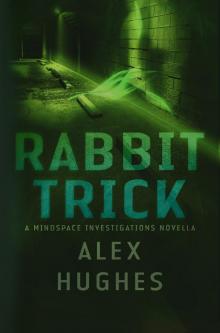 Rabbit Trick: A Mindspace Investigations Short Story
Rabbit Trick: A Mindspace Investigations Short Story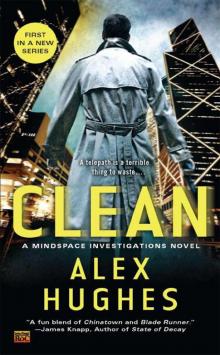 Clean: A Mindspace Investigations Novel
Clean: A Mindspace Investigations Novel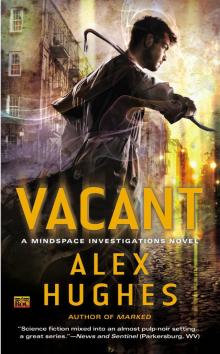 Vacant
Vacant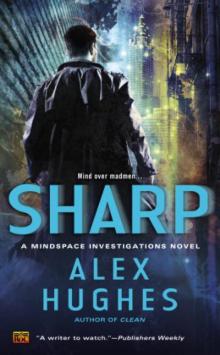 Sharp: A Mindspace Investigations Novel
Sharp: A Mindspace Investigations Novel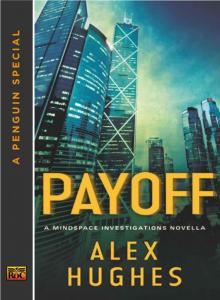 Payoff
Payoff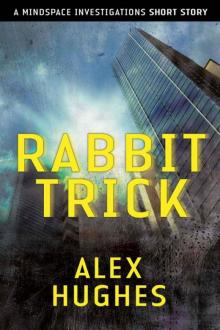 Rabbit Trick: A Mindspace Investigations Novella
Rabbit Trick: A Mindspace Investigations Novella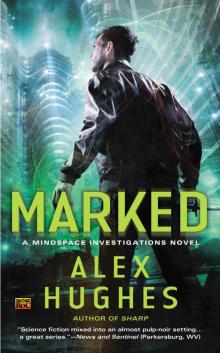 Marked
Marked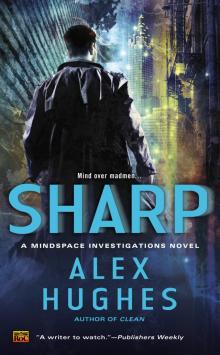 Sharp
Sharp